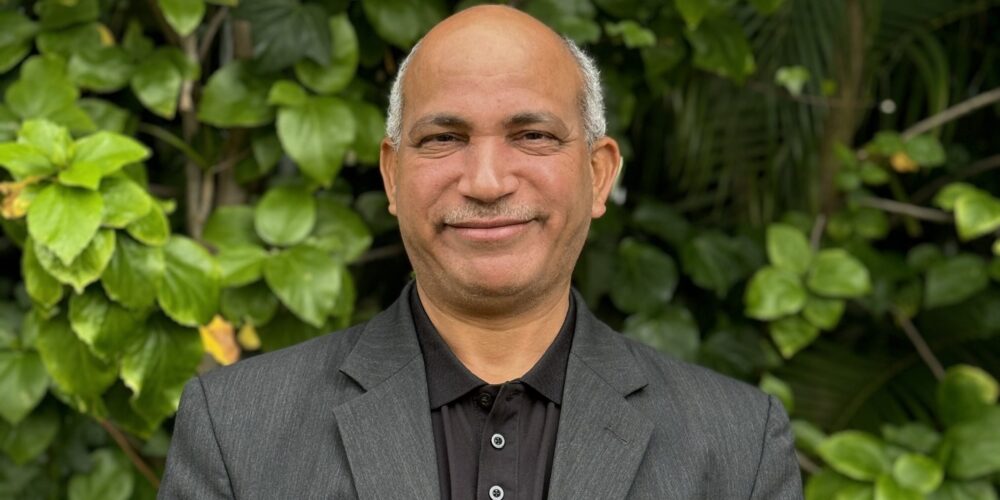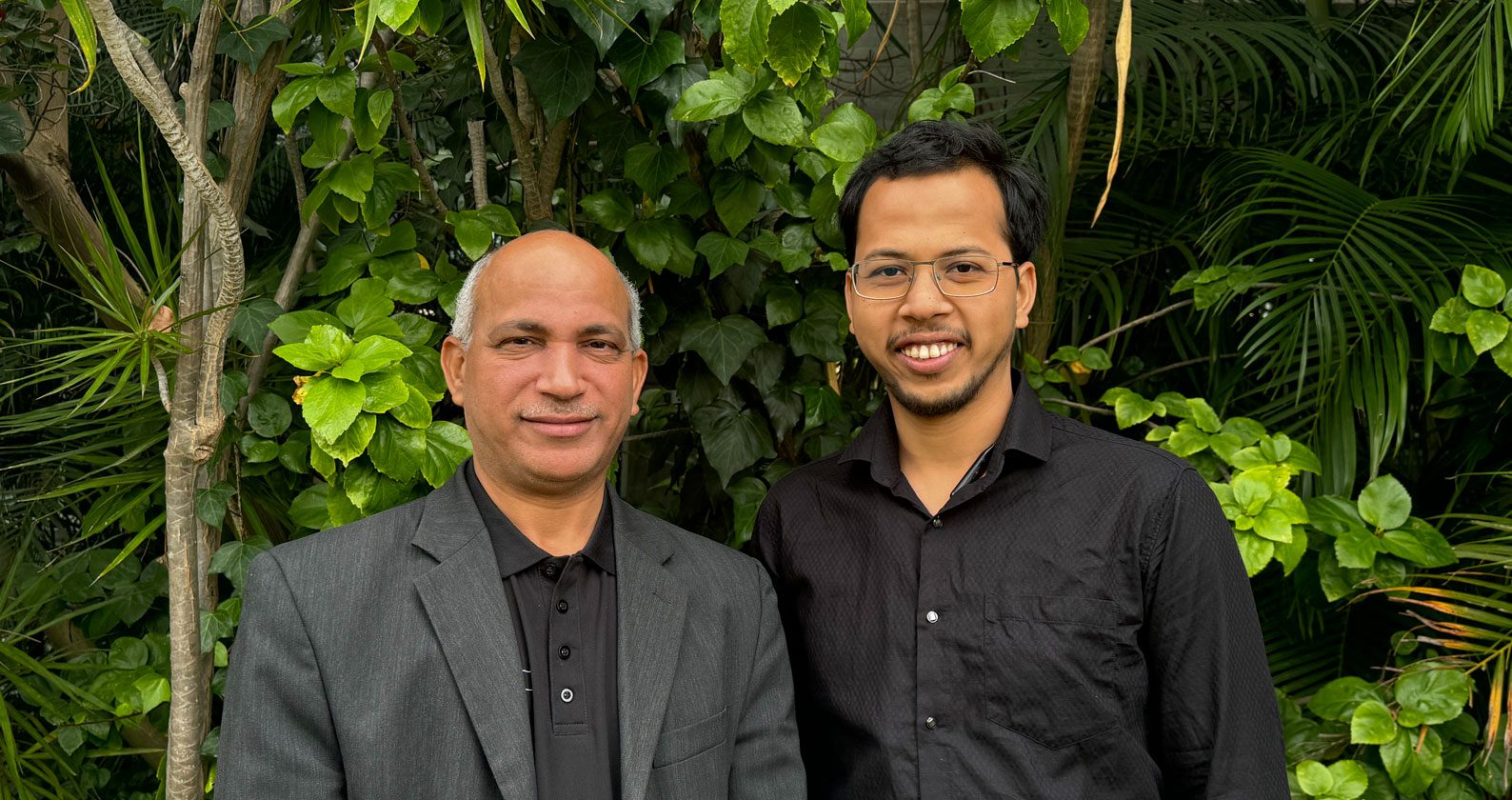Reading time: 7 minutes
Alam didn’t expect to complete a part of his degree in Australia, so when he got the opportunity, he jumped at the chance. Now, he’s completed two milestones in only one year at Curtin and contributed significantly to his field.
Khwaja Alamgir Ahmad (Alam) is currently completing a joint PhD in Chemical Engineering at Curtin and the Indian Institute of Technology (Indian School of Mines) Dhanbad, India, co-supervised by Curtin’s Associate Professor Hussein Znad and IIT’s Assistant Professor Ejaz Ahmad. Alam and his supervisors reflect on converting biomass into sustainable biofuels, the exceptional achievements of the project so far, and how to foster a strong student-supervisor relationship.
Alam:
I’ve always been passionate about chemistry since my school days, which naturally led me to pursue a Bachelor Degree in Chemical Engineering at the Birsa Institute of Technology Sindri in Jharkhand, India. Later, I completed my Master degree at IIT (ISM) Dhanbad, where I specialised in wastewater treatment. That experience deepened my interest in research and steered me toward a research-focused career. It was at IIT (ISM) Dhanbad that I met Professor Ejaz Ahmad, and after discussions with him, I was deeply inspired by his passion for research. That motivation led me to pursue a PhD under his supervision. When he encouraged me to apply for the collaborative PhD program at Curtin, I took the opportunity.
My research focuses on developing efficient methods for converting biomass, including agricultural waste, plant residues, and other organic materials, into sustainable biofuels and high-value chemicals. Specifically, I aim to produce eco-friendly additives for green diesel and sustainable aviation fuel. This work contributes to the advancement of cleaner energy technologies and supports global efforts to reduce greenhouse gas emissions.
In India, ‘stubble burning’, where farmers burn crop residues to clear fields, is a major source of air pollution. This practice releases significant amounts of particulate matter, carbon monoxide, and other harmful gases that contribute to smog and negatively impact public health. Through my research, I aim to address this issue in two ways: first, by providing a clean and renewable fuel alternative derived from agricultural waste, and second, by optimising catalytic processes to maximise the yield of valuable bio-based products.
The biggest advantage of this biomass-derived compound is that its outputs maintain carbon dioxide gas neutrality in the environment.
One of the key challenges I faced was designing effective catalysts. In our research, the catalyst plays a vital role in enhancing the conversion of biomass into valuable products. Initially, I encountered difficulties in achieving the desired reaction outcomes. To overcome this, I reviewed numerous research papers, synthesised a variety of catalysts, and conducted extensive experiments to identify the most suitable approach. With thorough research and experimentation, and under the guidance of my supervisors, I successfully developed a specific catalyst that significantly improved the yield of biofuels.
One of my early achievements was helping to set up a laboratory at IIT (ISM) Dhanbad, where I began writing a review paper on diesel fuel additives. This paper was later published in the Chemical Engineering Journal, a high-impact publication. Since then, I have authored four review papers, contributed to two book chapters, published two research articles, and have another paper currently under review. I have also participated in five international conferences. A notable highlight was receiving the Best Presentation Award at the CHEMCON International Conference in India. Additionally, I was one of the finalists in the Three-Minute Thesis competition in 2024.
The main highlight of the PhD was being able to study part of my PhD in Australia – I didn’t expect that.
During my PhD, my supervisors have provided invaluable guidance and support. They encouraged me to think independently, allowing me the freedom to explore ideas and manage my work autonomously. Their mentorship has been particularly impactful in enhancing my writing abilities, guiding me through the iterative process of drafting, refining, and perfecting my work. Their encouragement and expert advice have been fundamental in my ability to publish papers and develop my research profile. I am incredibly grateful for their continuous support, constructive feedback, and belief in my abilities, which have significantly shaped my research and professional growth.
Hussein:
Each week, I receive numerous supervision requests from students around the world, typically accompanied by their CVs. Alam was one such student. What stood out was that he was already enrolled in a PhD program and was seeking to conduct part of his research with us. He had prior publications in my area of expertise and demonstrated the specific skills I value in a researcher. This prompted me to arrange an online meeting with him.
Following our discussion, it was clear that Alam possessed the qualities we were looking for—strong research foundations, excellent technical skills, and effective communication and writing abilities. I was impressed and promptly issued both an acceptance and a supporting letter. Fortunately, the existing agreement between Curtin University and IIT (ISM) Dhanbad, India for collaborative PhD program facilitated a smooth process. He joined us in early 2024 and has since made a significant contribution to our research activities.
My supervisory style can be described as a blend of transformational and coaching approaches, tailored to the needs of individual students and the nature of their research. My focus is on developing students’ skills and capabilities. I provide tailored guidance and support, helping students identify their strengths and areas for improvement. I offer regular and constructive feedback, encourage self-reflection, and assist in setting realistic and achievable goals.
In research, we thrive on challenges—in fact, we actively seek them. This mindset is embedded in our approach to supervision; when a new PhD student joins, we encourage them to thoroughly review the literature and identify a gap as the starting point for their research. Challenges are an integral part of both our work and the PhD journey. One of the key practical challenges in this project has been the timely availability of chemicals. Due to supply chain delays, ordered materials can sometimes take considerable time to arrive. To address this, we carefully plan and estimate the quantities required for each experiment in advance to avoid interruptions. This is especially critical in Alam’s case, as he has just one year to complete his research objectives. Fortunately, we had contingency plans—Plan B and Plan C—in place, and thanks to this arrangement, he is currently ahead of schedule.
Alam successfully completed both Milestone One and Milestone Two within just six months—a pace that is exceptional by our standards. Many PhD students are unable to complete even the first milestone within their first year, yet he has already progressed to the third. Although the university requires substantial research progress before approving Milestone Three, Alam has clearly demonstrated this through the quality and quantity of his work. He has produced an impressive body of data and has already published 2 papers and one submitted for publication, oral presentation in an international conference in Melbourne in 2024, finalist for 3MT, an exceptional achievement for a PhD student at this stage.
Building a strong student-supervisor relationship is crucial for a successful PhD journey.
Building a strong student/supervisor relationship is a dynamic process that requires effort, communication, and mutual respect. By fostering open communication, setting clear goals, providing constructive feedback, and supporting both professional and personal growth, supervisors can create a positive and productive environment that benefits both the student and the research project.

Khwaja Alamgir Ahmad (Alam)
Alam is currently a joint PhD candidate in Chemical Engineering at Curtin University, Australia, and IIT (ISM) Dhanbad, India. His doctoral research explores catalytic methods for converting biomass into sustainable biofuels and high-value chemicals. Specifically, his work aims to develop environmentally friendly additives for green diesel and sustainable aviation fuels, contributing to cleaner energy technologies that support global sustainability goals.

Associate Professor Hussein Znad
Hussein is the founder and chair for Australia-Japan Network for Energy Transition & Critical Materials, and fellow of Royal Society of Chemistry (FRSC). Hussein has more than 17 years of experience in microalgae, resources recovery, wastewater treatment, CO2 mitigation, biofuel production (biohydrogen and biodiesel), with more than 100 peer-reviewed publications. Hussein is a recipient of the 2022 Curtin University Aspire Award and the 2020 Faculty Global Positioning Award.
Co-supervisor
Dr. Ejaz Ahmad is an Assistant Professor in the Department of Chemical Engineering, Head of Naresh Vashisht Centre for Hydrogen and CCUS Technologies, and Faculty In charge of Sponsored Research & Industrial Consultancy at IIT ISM Dhanbad. He is a two-time recipient of India’s prestigious Gandhian Young Technological Innovation Award (GYTI), awarded by the honourable president of India once and the science and technology minister a second time. His research focuses on heterogeneous catalysis for biorenewable energy, green gasoline, sustainable aviation fuel, clean hydrogen, waste to wealth, and Urban mining. He has also received the “German Academic Exchange Service (DAAD) Bi-national research grant”.



